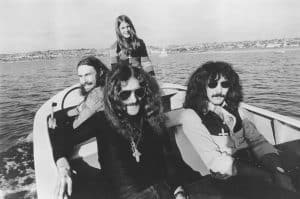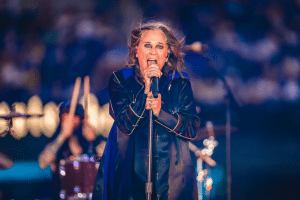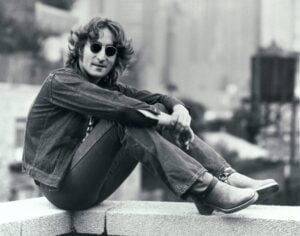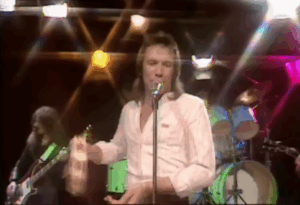The Controversial Songs From The Year 1960 to 2024
From the 1960s until 2024, music has consistently reflected changes in society, and the most impactful songs are frequently accompanied by controversy. Songs like Eminem’s “Fuel” and Katy Perry’s “Woman’s World” generated controversy in 2024; the latter due to its insensitive allusion to a catastrophe, while the former because of its outdated lyrics and association with Dr. Luke. However, criticism of these artists is not new. Music has always reflected the changes in society, with timeless tunes like “We Shall Overcome” still motivating people to take action. From protest anthems to rock ‘n’ roll, contentious music frequently takes the lead in influencing our culture.
1960: ‘Will You Still Love Me Tomorrow’ by The Shirelles
The first number one record from an all-Black female group, “Will You Still Love Me Tomorrow,” may not seem like much today, but in 1960, its sexual overtones resulted in broadcast bans. The song gained popularity in spite of the controversy and was covered by several people, including co-writer Carole King.
1961: ‘The Lion Sleeps Tonight’ by The Tokens
It took decades for the underlying controversy behind the song that gave the Tokens their sole number one hit to come to light. Solomon Linda, a Zulu migrant worker, wrote the song before the group claimed it as their own. An undisclosed settlement was reached in 2006 after Linda’s descendants sued Disney for royalties related to its use in The Lion King.
1962: ‘He Hit Me (And It Felt Like a Kiss)’ by The Crystals
Over time, certain songs could seem tame, but not this Crystals song. The song tackles the subject of domestic violence in a profoundly distressing manner, as implied by its title. The song’s history was further tainted by the fact that Phil Spector, who would go on to be found guilty of second-degree murder, produced it.
1963: ‘A Hard Rain’s a-Gonna Fall’ by Bob Dylan
Among the many well-known protest songs from Bob Dylan’s early folk albums, “A Hard Rain’s a-Gonna Fall” sticks out for its apocalyptic tone, which makes it feel especially pertinent today. Dylan actually sang the song live a month before to the incident, despite allegations that it was inspired by the Cuban missile crisis (in part because to his own clues).
1964: ‘A Change is Gonna Come’ by Sam Cooke
Shortly after Sam Cooke and his friends were turned away from a Holiday Inn in Shreveport, Louisiana, this eerie classic is supposed to have been penned. Bob Dylan’s civil rights anthem “Blowin’ in the Wind,” which Cooke often sang, also had an impact. The song blends depressing moments with flashes of inspiration and hope with unadulterated passion.
1965: ‘Eve of Destruction’ by Barry McGuire
This stirring song, which was widely interpreted as a protest against the Vietnam War, denounces prejudice and violence everywhere. Many U.S. radio stations deemed its lyrics offensive, despite the fact that they were devoid of profanity or references to drugs. Even now, the phrase “you’re old enough to kill but not for votin'” still has resonance.
1966: ‘Four Women’ by Nina Simone
Vibrant depictions of slavery, trauma, and exploitation were evoked by Nina Simone’s compelling tale of four Black women. A generation of young, motivated women were profoundly affected by her passionate delivery, which released a real, cathartic cry. She left a lasting impression on listeners and culture with her music.
1967: ‘Light My Fire’ by The Doors
The Ed Sullivan Show was blind to the profound change in society that took place in 1967. In “Light My Fire,” Jim Morrison was asked by the producers to change the word “higher” to “better.” When he refused, the Doors were ejected from the stage.
1968: ‘Say it Loud (I’m Black and I’m Proud)’ by James Brown
James Brown released a potent anthem with a funk foundation in 1968. The song addressed racism and advocated for Black empowerment and was released as part of his album Say It Loud – I’m Black and I’m Proud. That year, Brown also backed Hubert Humphrey, the Democratic presidential nominee, who used both music and politics to spread his message of social change.
1969: ‘Give Peace a Chance’ by the Plastic Ono Band
The slogan “Give peace a chance” was first used by John Lennon during a widely reported bed-in, and on the last day of the event, he and Yoko Ono recorded this song. It was released in the midst of the Vietnam War and made a strong and unvarnished call for compassion and love. Lennon’s first #1 single outside of the Beatles was also a result.
1970: ‘Ohio’ by Crosby, Stills, Nash & Young
Neil Young wrote this potent protest song with CSNY as a way to vent his rage over the horrific shooting of four unarmed students by the Ohio National Guard in 1970. Many mainstream AM radio stations banned the song because of its strong political message, which called out President Richard Nixon and called for change.
1971: ‘The Revolution Will Not Be Televised’ by Gil Scott-Heron
Gil Scott-Heron produced this potent spoken-word poetry in 1970, drawing inspiration from the Black Power slogan of the 1960s. He re-recorded it with a full band a year later and used it as the B-side to his first single. The song cautions against media manipulation and calls for grassroots activism—issues that are still relevant today.
1972: ‘Give Ireland Back to the Irish’ by Wings
Although John Lennon was dubbed the rebel, Paul McCartney was also controversial. After hearing “Bloody Sunday,” he and Linda wrote this politically charged song right away. It sparked intense reactions when it was quickly banned from UK airwaves due to the tension surrounding Northern Ireland.
1973: ‘Living for the City’ by Stevie Wonder
Once a kid prodigy and later a Motown hero, Stevie Wonder started exploring deep themes in the early 1970s. This exceptional song combines memorable choruses with a realistic depiction of inner-city hardships. It’s one of the first soul singles to address institutional racism with such intensity and clarity, and it’s widely applauded.
1974: ‘Sweet Home Alabama’ by Lynyrd Skynyrd
Lynyrd Skynyrd’s Southern anthem, which is still a radio favorite, jokingly names Governor George Wallace and calls out Neil Young. But the band wasn’t actually at odds with Young or supporting Wallace’s political views. Fun fact: none of the three songwriters of the song were even from Alabama.
1975: ‘The Pill’ by Loretta Lynn
With a bold song on birth control, Loretta Lynn provoked controversy by urging married ladies to think about the pill through honesty and comedy. With her audacious lyrics, such as “this incubator is overused,” she was criticized by a Kentucky preacher and banned from country radio. Paradoxically, the criticism served to increase the song’s appeal.
1976: ‘Hurricane’ by Bob Dylan
Bob Dylan had shifted away from protest songs by the 1970s, but this song demonstrated that he was still relevant. It recounts the tale of boxer Rubin Carter, whose unfair arrest and erroneous conviction were rife with injustice. After his case was reversed on procedural grounds, Carter was released over ten years later, confirming Dylan’s potent message.
1977: ‘God Save the Queen’ by Sex Pistols
This punk hymn, which was banned by the BBC for its “gross bad taste,” compared British aristocracy to a “fascist regime.” It was included on the Sex Pistols’ sole album, which was released in 1977, and it solidified the movement’s status as a disruptive cultural force. “God Save the Queen” is regarded by many as one of the most contentious songs ever written.
1978: ‘(Sing If You’re) Glad to Be Gay’ by the Tom Robinson Band
In this groundbreaking ballad, the Tom Robinson Band bravely exposed British hypocrisy and celebrated gay culture. Before putting it on an EP, Tom Robinson, a gay man, wrote it for the London Gay Pride Parade. The song became a huge smash on Capitol Radio even though BBC Radio 1 refused to play it.
1979: ‘Another Brick in the Wall (Part 2)’ by Pink Floyd
A children’s chorus singing “Teachers! Leave those kids alone!” during Pink Floyd’s song provoked heated reactions, particularly from British Prime Minister Margaret Thatcher. As a protest against apartheid-era education, South African students adopted the chorus, which further increased the song’s popularity and resulted in its complete prohibition by local radio stations.
1980: ‘Redemption Song’ by Bob Marley
Bob Marley, a legendary reggae artist, called for emancipation from both mental and physical slavery in this stirring acoustic ballad from his ninth album. The song embodies Marley’s enduring message of optimism by promoting redemption via emancipation. It marked a moving conclusion to his musical career as it became both his last single and his final live performance.
1981: ‘Spasticus Autisticus’ by Ian Dury and the Blockheads
Ian Dury, a punk rocker and polio survivor, was not pleased with the UN’s declaration of 1981 as the “Year of the Disabled.” In reaction, he and co-writer Chaz Jankel wrote this thought-provoking song to protest the symbolic gesture. As expected, it was banned by the BBC, causing controversy and seeking to put a stop to Dury’s career.
1982: ‘The Message’ by the Grandmaster Flash and the Furious Five
In this classic song, hip-hop superstar Grandmaster Flash explores the brutal reality of inner-city living. His unvarnished, gritty storytelling helped establish the foundation for organizations such as Public Enemy and N.W.A. The song’s lyrics, such as “You’ll grow in the ghetto livin’ second-rate,” continue to have a strong impact on the social justice and Black Lives Matter movements of today.
1983: ‘Relax’ by Frankie Goes to Hollywood
At initially, Frankie Goes to Hollywood’s controversial single had trouble becoming popular. However, it began to attract attention with a daring advertising campaign and graphic video. The controversy only served to increase the song’s popularity after the BBC banned it, catapulting it to the top of the UK charts. charts for a period of five weeks.
1984: ‘Born in the USA’ by Bruce Springsteen
Bruce Springsteen’s “Born in the U.S.A.” is one of the most misinterpreted anthems in history because it blends lively music with a strong chorus. Originally intended to draw attention to the hardships faced by veterans of the war, Ronald Reagan’s 1984 campaign turned it into a patriotic hymn. Many people today mistakenly believe it to be a song of celebration rather than criticism.
1985: ‘Sun City’ by United Artists Against Apartheid
Following 37 years of apartheid in South Africa, Steven Van Zandt and Arthur Baker assembled a remarkable group of musicians to compose a potent protest song in 1985. The song became a historic collaboration with artists like Miles Davis and Joey Ramone, with the goal of bringing attention to the harsh system of racial segregation on a global scale.
1986: ‘Dear God’ by XTC
Do you want to cause controversy in the United States? Simply compose a song that is anti-religious and play it on the radio. Andy Partridge of XTC accomplished just that with the song “Dear God.” It was one of the most inflammatory songs of its era, evoking a hostage scenario, bomb threats, and irate calls.
1987: ‘Beds Are Burning’ by Midnight Oil
Midnight Oil, an Australian rock band, exploited their worldwide success to remind people that the genocide of Indigenous people served as the foundation for Australia. Reparations for the Aboriginal Pintupi were demanded in the catchy protest song. It was re-recorded and reworked as a climate change awareness anthem in 2009.
1988: ‘F–k tha Police’ by N.W.A
Hip-hop group N.W.A. challenged the boundaries of free expression in 1988 with their contentious song that described police abuse in graphic and unvarnished terms. The group was arrested in 1989 after performing the song live in Detroit, which infuriated law enforcement around the country. The song turned into a pivotal point in the protest-filled history of hip-hop.
1989: ‘Fight the Power’ by Public Enemy
Chuck D and Flavor Flav of Public Enemy performed one of the most potent protest songs in hip-hop in 1989. The song sparked a call for resistance by addressing racism and the Black experience in America. It was first heard on the soundtrack to “Do the Right Thing” and then on the band’s well-known album Fear of a Black Planet.
1990: ‘Justify My Love’ by Madonna
A year after the controversy surrounding “Like a Prayer,” Madonna’s controversial music video for this obscure song sparked even more outrage. Despite being swiftly banned by MTV due to its graphic content, the video sold a ton of VHS copies, converting the controversy into a great economic success for the pop star.
1991: ‘Brenda’s Got a Baby’ by 2Pac
In his first big success, 2Pac created a compelling story that was inspired by a tragic newspaper article. Brenda, a teenage mother in the ghetto, struggles to care for her newborn in the song. His first album, “2Pacalypse Now,” had the song that former Vice President Dan Quayle notably denounced.
1992: ‘Killing in the Name’ by Rage Against the Machine
As implied by their name, Rage Against the Machine adopted an unreserved position on social and political concerns. Their debut album’s lead hit, which takes aim at racism and police brutality, is still a seminal hymn. Its use of strong language and publication following the L.A. riots, the song was banned and censored by a number of media outlets.
1993: ‘Rebel Girl’ by Bikini Kill
“Rebel Girl,” which came out in three different forms, helped to establish the riot grrrl movement. It bravely accepted a queer perspective and was brimming with punk vigor and feminist fire. Rock icon Joan Jett produced the song, which became an anthem for resistance and empowerment. Jett also provided guitar and backing vocals.
1994: ‘Closer’ by Nine Inch Nails
When it was released, Nine Inch Nails’ renowned song startled fans with its ominous industrial sound. Its notoriously sexual lyrics and eerie music video, which resembled a body-horror movie, caused controversy. Even though the song was banned from airing, suburban parents continued to voice their displeasure, despite its indisputable influence.
1995: ‘Just a Girl’ by No Doubt
This famous tune, which features Gwen Stefani’s masterful fusion of irony and fury, catapulted No Doubt to fame. With sardonic wit and audacious defiance, she confronts sexist clichés in the context of the contemporary patriarchy. “Oh, am I being explicit?She asks, and the response is a resounding, clear “yes.”
1996: ‘Love is a Good Thing’ by Sheryl Crow
Although not everyone enjoyed this song, Sheryl Crow was well-known by the time her second album was released. Kids using “a gun they bought at Walmart discount stores” was a controversial line. One of Crow’s most contentious songs, the record was taken off the store’s shelves in retaliation.
1997: ‘This Is Not Your Country’ by Morrissey
Morrissey, who is never afraid to voice his opinions, caused controversy with this song from 1997. He had a nationalist approach to immigration that many perceived as bigoted. Morrissey, however, would contend that this was precisely what he intended, challenging listeners to consider the song’s harsh tone and underlying message.
1998: ‘Eisler on the Go’ by Billy Bragg & Wilco
Billy Bragg & Wilco’s 1998 album Mermaid Avenue was inspired by Woody Guthrie’s extensive collection of untapped lyrics, which they set to music. One particularly noteworthy song, “Eisler on the Go,” is about the communist and Austrian composer Hanns Eisler. By using fresh melodies and arrangements to bring Guthrie’s unheard lyrics to life, the song embodies his socially minded legacy.
1999: ‘Goodbye Earl’ by Dixie Chicks
Dennis Linde wrote this darkly funny country song, which was made popular by the Dixie Chicks (now the Chicks). It relates the tale of two ladies, Wanda and Mary Ann, who conspire to murder Wanda’s violent husband, Earl. It was released in 1999, and when multiple radio stations refused to play it in 2000, it became well-known.
2000: ‘Stan’ by Eminem
This breakthrough tune served as the foundation for Eminem’s second album, which carried on his contentious trend. What starts out as a collection of fan letters takes a sinister turn and develops into a perverse illustration of art that mimics life. The issue has already gotten out of hand by the time Eminem answers.
2001: ‘Makeshift Patriot’ by Sage Francis
Sage Francis of Rhode Island visited Ground Zero five days after 9/11, and a month later, he used his experiences to create this underground hit. The song exposes the genuine human cost of the disaster while criticizing capitalist greed and media manipulation. Many of Francis’ incisive lyrics now seem uncannily prophetic in retrospect.
2002: ‘Dirrty’ by Christina Aguilera
Christina Aguilera changed from a charming pop diva to a fearless, controversial person with her fourth album, Stripped. With its bold imagery and revealing graphics, the lead single’s music video makes a statement. The rapid and sexist criticism that followed was a turning point in her career.
2003: ‘(s)AINT’ by Marilyn Manson
Marilyn Manson was already well-known for igniting controversy when he released this harsh song. Asia Argento directed the self-funded music video, which was full of taboo themes and graphic images. Without hesitation, Manson’s own record company banned the video in 2003 before the public outcry had started.
2004: ‘American Idiot’ by Green Day
Green Day shifted gears with this sharp single, criticizing media hysteria and its power to manipulate. With the line “Can you hear the sound of hysteria?” the song takes aim at fear-driven tactics. Though not directly targeting politicians, the song was co-opted for political purposes in Britain in 2018.
2005: ‘B.Y.O.B’ by System of a Down
System of a Down carries on Rage Against the Machine’s heritage by questioning societal and political conventions. This powerful, award-winning protest song, which was released during the Iraq War, challenges the rationale behind sending the impoverished to fight. Lead singer Serj Tankian fervently repeats, “Why do they always send the poor?” with quick changes in pace.
2006: ‘Not Ready to Make Nice’ by Dixie Chicks
The Dixie Chicks faced widespread criticism in 2003 after lead singer Natalie Maines criticized George W. Bush. With the strong and uncompromising anthem “Not Ready to Make Nice,” the band responded in 2006. Their biggest U.S. hit and a testament to tenacity, the outspoken song touched a nerve.
2007: ‘Paper Planes’ by M.I.A.
Border crossings and forged visas were contentious enough, but what really stirred things up were the booming gunshots in the chorus. During airing, MTV and radio stations muffled the gunfire, which lessened the song’s unadulterated power. This was just another chapter in the career of British rapper M.I.A., who is known for making strong comments.
2008: ‘I Kissed a Girl’ by Katy Perry
With this hit song, Katy Perry left her roots in Christian music and made her debut in the mainstream industry. Although some people had conflicting feelings about the lyrics, her appropriation of LGBT culture was the subject of the most criticism. The song relied on “a couple of stereotypes” in its approach, Perry subsequently admitted.
2009: ‘If You Seek Amy’ by Britney Spears
With this sassy song, international superstar Britney Spears boldly declared that she was no longer a girl but rather a woman. Not surprisingly, the American Parents Television Council didn’t find the humor in the song, which was released as the third single from her sixth album and isn’t about finding someone named “Amy.”
2010: ‘Pumped Up Kicks’ by Foster the People
A dark, unnerving topic of anti-gun violence is combined with an energetic sound in this 2010 indie pop hit. The song’s lyrics delve into the deranged thoughts of a disturbed adolescent, offering a timeless reflection on mass killings. MTV came under fire from Foster the People for their perceived hypocritical banning of the song.
2011: ‘Man Down’ by Rihanna
This song and its dramatic music video, which was partially inspired by Bob Marley’s “I Shot the Sheriff,” portray Rihanna as a vindictive assault survivor. By killing her assailant, her heroine takes justice into her own hands. Rihanna used Twitter to defend the song’s audacious and contentious plot in the face of intense criticism and complaints.
2012: ‘Putin Lights up the Fires’ by Pussy Riot
When members of the Pussy Riot were imprisoned in 2012 for “hooliganism motivated by religious hatred,” the group responded with this rebellious song. “Seven years is not enough—give us 18!” they exclaimed, remaining true to their bold manner. Luckily for them, the Russian authorities declined their challenge.
2013: ‘We Can’t Stop’ by Miley Cyrus
Miley Cyrus took a daring departure from her Disney days in 2013 with her suggestive party anthem, which was full of drug references. Reggae musician Michael May sparked a copyright complaint after accusing Cyrus of stealing his lyrics, which added to the turmoil. The song’s controversy remained in the public eye after the legal battle ended with an undisclosed settlement.
2014: ‘American Skin (41 Shots)’ by Bruce Springsteen
This protest song had already sparked more than ten years of discussion before it was included on Bruce Springsteen’s 2014 album High Hopes. Amadou Diallo’s 1999 police shooting served as the impetus for its 2000 Madison Square Garden debut. The NYPD Patrolmen’s Benevolent Association was incensed and called on fans to completely stop listening to Springsteen’s music.
2015: ‘I Can’t Breathe’ by Pussy Riot
Pussy Riot returned to their activities in 2015, unfazed by their incarceration. Their first English-language song, a potent anthem against war and police brutality, caused a stir in the United States. “I Can’t Breathe,” which is titled after Eric Garner’s last words, honors those who have been subjected to violence and systematic oppression.
2016: ‘Formation’ by Beyoncé
Prior to 2016, Beyoncé’s music hardly ever addressed Black American concerns. She launched a potent hymn based on Black female empowerment with “Formation,” however. Her Super Bowl halftime performance, with its audacious, militant tone, only heightened the debate and cemented her as a formidable cultural force. The song’s aggressive video also caused controversy.
2017: ‘The Heart Part 4’ by Kendrick Lamar
With this eagerly awaited song, the fourth in his “The Heart” series, Kendrick Lamar stirred things up. He attacks former President Donald Trump, gets into feuds with other rappers, and boldly declares himself the “greatest rapper alive”—a claim that may hold water considering his skill as a lyricist and his influence on culture.
2018: ‘This is America’ by Childish Gambino
“This Is America” by Childish Gambino swiftly rose to prominence as one of the 21st century’s most talked-about videos. It creates a strong, enduring statement by tying together more than a century of racial battles in less than five minutes. Even as trends change, this song’s influence endures because it speaks to the cultural and socioeconomic climate of our day.
2019: ‘7 Rings’ by Ariana Grande
Despite being a fan favorite, Ariana Grande is not exempt to controversy. Her #1 track and its accompanying video were accused of cultural appropriation after they broke a 24-hour Spotify record for the most streams. Grande declined to sing the song at the 2019 Grammy Awards, opting instead to miss the entire event.
2020: ‘WAP’ by Cardi B and Megan Thee Stallion
Rappers Cardi B and Megan Thee Stallion’s “WAP,” with its audacious, graphic lyrics, pushed limits and continued the tradition of female sexual expression. Following Cardi B’s Grammy performance, the FCC allegedly attempted to prosecute her, and the song provoked conservative criticism. “WAP” sparked the greatest criticism out of all the sex-positive anthems.
2021: ‘Montero (Call Me By Your Name)’ by Lil Nas X
With its daring imagery, which featured Lil Nas X sliding down a pole to hell and performing a lap dance for the devil, the music video for “Montero (Call Me By Your Name)” sparked controversy. The song wasn’t banned, but several international fans claimed it wasn’t available in their countries, and conservative critics criticized the homosexual undertones.
2022: ‘Grrrls’ by Lizzo
As soon as Lizzo’s song first used the word “spaz,” fans expressed disapproval of the ableist wording. In contrast to many musicians, Lizzo accepted responsibility, revising the song’s lyrics and apologizing in public within a week. Although she is renowned for pushing boundaries, her proactive approach garnered acclaim, demonstrating that she respects certain boundaries.
2023: ‘Try That In A Small Town’ by Jason Aldean
In the midst of current discussions about racism, Aldean’s music video featured footage from Black Lives Matter protests along with lyrics like “Try that in a small town/ See how far you make it down the road.” Critics claimed the song encourages violence. Consequently, Country Music Television made the decision to remove the video from its airplay.
2024: ‘Not Like Us’ by Kendrick Lamar
Drake’s two diss recordings directed against Kendrick Lamar in April 2024 marked the height of their dispute. Lamar responded by releasing the popular song “Not Like Us,” which questioned Drake’s sincerity and criticized him for alleged sexual misconduct. Lamar won the battle since the song topped the Billboard Hot Rap Songs list for 25 weeks.













































































